Guest Blogged by Arlen Parsa
{Ed Note: An error in this report was later discovered while working on a follow-up to it. The illegality of the Bush military pay raise proposal as described in the report below, is based on a 1999 law which phased out the pay formula that Bush failed to meet, by fiscal year 2008. Lawmakers are in the process of restoring that provision, even while another law also keeps the legality of Bush's proposal in doubt. The full details and explanation for the error, after combing through a soup of defense authorization provisions, are explained in our follow up report. The BRAD BLOG regrets the error.}
Recently the Bush Administration and Democratically-controlled Congress were at odds over how much to pay US soldiers serving in the most dangerous places in the world: Iraq and Afghanistan. Congress said that the troops should get a raise of 3.5%, while the Administration said any raise higher than 3% was not deserved. Administration officials even bluntly said the White House "strongly opposes" giving the troops that extra 0.5%.
Although Democrats have been arguing for the 3.5% raise, what neither they, nor any news organization seems to have thus far noticed, is that the Administration's meager compensation plan would be, in fact, illegal.
 Increases in military salary are traditionally determined by increases in average civilian salary, according to a method of measurement called the Employment Cost Index. Regardless of the actual dollar increase in salary, the base pay for service-members must be at least 0.5% above the corresponding civilian pay because of a Defense Authorization Act which Congress passed in 1999.
Increases in military salary are traditionally determined by increases in average civilian salary, according to a method of measurement called the Employment Cost Index. Regardless of the actual dollar increase in salary, the base pay for service-members must be at least 0.5% above the corresponding civilian pay because of a Defense Authorization Act which Congress passed in 1999.
But according to Bureau of Labor Statistics numbers, the Bush Administration's proposed raise of only 3% for active-duty troops in Iraq and Afghanistan is actually less than the average increase in civilian wages from 2006 to 2007 (3.3%), instead of the required 0.5% more than the average civilian wage (which would be equal to 3.8%).
If Congress passes the funding plan that the Administration has proposed, they will, in effect, be illegally depriving the troops of the minimum pay raise guaranteed to them by the earlier law. The move would save the Bush Administration millions and could cost new US Army recruits (who are the least effected by the proposed pay raise) a few hundred dollars annually.
Still, some service-members might take comfort from the fact that the issue at hand is a raise in salary, not a decrease, as the Bush Administration and the Department of Defense had previously tried to pull off in 2003, until they got caught red-handed attempting to stiff U.S. troops back then as well...
In the summer of 2003, the Bush Administration secretly planned pay cuts for soldiers serving in Iraq and Afghanistan. It was not until the plan was made public that the White House was forced to make an embarrassing political flip-flop on the matter, but not before several high-profile Democrats decried their efforts to save money by depriving the troops of their "imminent danger pay."
As a result, American troops in Iraq and Afghanistan who faced considerable risk of being "killed, injured, or wounded by hostile fire, explosion of a hostile mine, or any other hostile action," were allowed to keep their imminent danger pay. Even so, that isn't much compared to the $2,100 a month that the Canadian government gives as a bonus to its soldiers stationed in hostile places like Afghanistan-- tax free.
That's about $1,929 when converted to American dollars, which is still a far cry from the extra $7.50 each day that American soldiers get for putting themselves in the most dangerous place in the world.
The average salary of males age 25 and over in the United States is more than $39,000 according to the US Census Bureau. There are soldiers in Iraq earning less than half that in basic pay.
Republican Representative Mike Pence of Indiana recently compared an Iraqi market he visited --- one that had been scene of an earlier car bomb --- to a "normal outdoor market in Indiana in the summertime." The average Indiana police officer earns more than $45,000 according to data available on the website Salary.com. Privates starting out in the US Army, on the other hand, can get better pay at McDonalds flipping burgers.
Questions also arise about the pay that American soldiers are given compared to that of Iraqi soldiers. The minimum wage in Iraq is the equivalent of 70 US dollars a month, and although the new Iraqi Army was paid that wage at its inception in 2003, officials later raised Iraqi salaries by four times that amount. Still, Iraqi soldiers complain that this is still not nearly enough money to compensate them for the enormous risks they face on the job. So far in 2007, 419 American soldiers have died in Iraq, but more than twice that number of Iraqi security forces have been killed, according to the website iCasualties.org which monitors fatalities in the conflict.
It's not just American soldiers who are being paid shockingly low wages for their service. British soldiers in Iraq risking their lives in the middle east are paid less than the average starting salary of a police officer back home in England --- less than half of the British minimum wage. One British officer complained to the UK newspaper The Independent last year: "Frankly, [British privates] would make more money emptying dustbins. They are being treated appallingly."
Unless those dustbins are located in the middle of a war zone, it's probably safe to say that emptying them is a lot less dangerous --- and smell every bit as bad --- as the job soldiers are being asked to do in Iraq and Afghanistan.
Update: An earlier version of this item incorrectly stated that the increase in ECI from 2006 to 2007 was 3.2%, it was actually 3.3%, meaning that the Administration's salary plan would deprive service-members of slightly more salary than previously thought. I regret the error.


 'Green News Report' 9/18/25
'Green News Report' 9/18/25
 MAGA Exploiting Kirk's Death as Their 9/11: 'BradCast' 9/17/25
MAGA Exploiting Kirk's Death as Their 9/11: 'BradCast' 9/17/25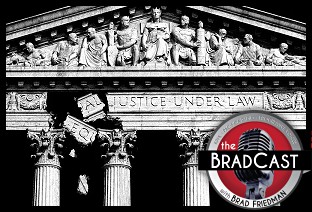 Our Crumbling Courts and Withering Rule of Law: 'BradCast' 9/16/25
Our Crumbling Courts and Withering Rule of Law: 'BradCast' 9/16/25 'Green News Report' 9/16/25
'Green News Report' 9/16/25 After Kirk Murder, First Amendment, But Not Second, Under Attack. Prove Me Wrong: 'BradCast' 9/15/25
After Kirk Murder, First Amendment, But Not Second, Under Attack. Prove Me Wrong: 'BradCast' 9/15/25 Sunday 'False Narrative' Toons
Sunday 'False Narrative' Toons SCOTUS Suspension of 4th Amendment Rights Poses Ominous Threat to Constitutional Republic
SCOTUS Suspension of 4th Amendment Rights Poses Ominous Threat to Constitutional Republic 'Dark Moment for America': 'BradCast' 9/11/25
'Dark Moment for America': 'BradCast' 9/11/25 Kirk Assassinated in UT; Shutdown Battle Takes Shape in D.C.: 'BradCast' 9/10/25
Kirk Assassinated in UT; Shutdown Battle Takes Shape in D.C.: 'BradCast' 9/10/25 Despite Voting Co. Lawsuit, Fox Ready to Shout Fake 'Fraud' Again: 'BradCast' 9/9
Despite Voting Co. Lawsuit, Fox Ready to Shout Fake 'Fraud' Again: 'BradCast' 9/9  'Green News Report' 9/9/25
'Green News Report' 9/9/25 Trump Readies Wars on Venezuela and Chicago: 'BradCast' 9/8/25
Trump Readies Wars on Venezuela and Chicago: 'BradCast' 9/8/25 Sunday 'Big Ball Room' Toons
Sunday 'Big Ball Room' Toons 'Green News Report' 9/4/25
'Green News Report' 9/4/25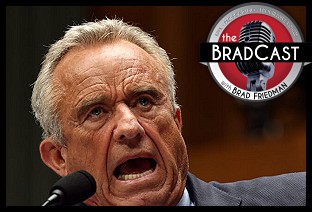 RFK Jr.'s War on the Science of Public Health: 'BradCast' 9/4/25
RFK Jr.'s War on the Science of Public Health: 'BradCast' 9/4/25 Trump's 'Cook'ed-Up Mortgage Fraud Claims: 'BradCast' 9/3/25
Trump's 'Cook'ed-Up Mortgage Fraud Claims: 'BradCast' 9/3/25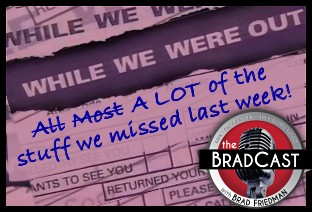 While We Were Out: 'BradCast' 9/2/25
While We Were Out: 'BradCast' 9/2/25 Hypocrisy Behind RW Opposition To CA 'Election Rigging Response Act'
Hypocrisy Behind RW Opposition To CA 'Election Rigging Response Act' CA's 'Deterrence' Map; Trump's 'Fascist Theatre': 'BradCast' 8/21/25
CA's 'Deterrence' Map; Trump's 'Fascist Theatre': 'BradCast' 8/21/25 Trump's 'Stalinesque' Plot to Whitewash History: 'BradCast' 8/20/25
Trump's 'Stalinesque' Plot to Whitewash History: 'BradCast' 8/20/25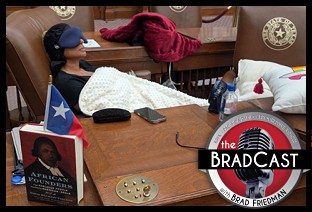 TX GOP Imprisons Dem State Lawmaker in State House: 'BradCast' 8/19/25
TX GOP Imprisons Dem State Lawmaker in State House: 'BradCast' 8/19/25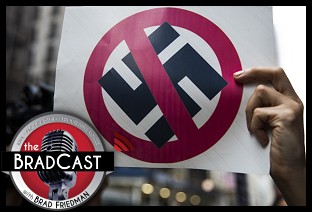 Trump, Nazis and Trump's Nazified Elections: 'BradCast' 8/18/25
Trump, Nazis and Trump's Nazified Elections: 'BradCast' 8/18/25
 VA GOP VOTER REG FRAUDSTER OFF HOOK
VA GOP VOTER REG FRAUDSTER OFF HOOK Criminal GOP Voter Registration Fraud Probe Expanding in VA
Criminal GOP Voter Registration Fraud Probe Expanding in VA DOJ PROBE SOUGHT AFTER VA ARREST
DOJ PROBE SOUGHT AFTER VA ARREST Arrest in VA: GOP Voter Reg Scandal Widens
Arrest in VA: GOP Voter Reg Scandal Widens ALL TOGETHER: ROVE, SPROUL, KOCHS, RNC
ALL TOGETHER: ROVE, SPROUL, KOCHS, RNC LATimes: RNC's 'Fired' Sproul Working for Repubs in 'as Many as 30 States'
LATimes: RNC's 'Fired' Sproul Working for Repubs in 'as Many as 30 States' 'Fired' Sproul Group 'Cloned', Still Working for Republicans in At Least 10 States
'Fired' Sproul Group 'Cloned', Still Working for Republicans in At Least 10 States FINALLY: FOX ON GOP REG FRAUD SCANDAL
FINALLY: FOX ON GOP REG FRAUD SCANDAL COLORADO FOLLOWS FLORIDA WITH GOP CRIMINAL INVESTIGATION
COLORADO FOLLOWS FLORIDA WITH GOP CRIMINAL INVESTIGATION CRIMINAL PROBE LAUNCHED INTO GOP VOTER REGISTRATION FRAUD SCANDAL IN FL
CRIMINAL PROBE LAUNCHED INTO GOP VOTER REGISTRATION FRAUD SCANDAL IN FL Brad Breaks PA Photo ID & GOP Registration Fraud Scandal News on Hartmann TV
Brad Breaks PA Photo ID & GOP Registration Fraud Scandal News on Hartmann TV  CAUGHT ON TAPE: COORDINATED NATIONWIDE GOP VOTER REG SCAM
CAUGHT ON TAPE: COORDINATED NATIONWIDE GOP VOTER REG SCAM CRIMINAL ELECTION FRAUD COMPLAINT FILED AGAINST GOP 'FRAUD' FIRM
CRIMINAL ELECTION FRAUD COMPLAINT FILED AGAINST GOP 'FRAUD' FIRM RICK SCOTT GETS ROLLED IN GOP REGISTRATION FRAUD SCANDAL
RICK SCOTT GETS ROLLED IN GOP REGISTRATION FRAUD SCANDAL VIDEO: Brad Breaks GOP Reg Fraud Scandal on Hartmann TV
VIDEO: Brad Breaks GOP Reg Fraud Scandal on Hartmann TV RNC FIRES NATIONAL VOTER REGISTRATION FIRM FOR FRAUD
RNC FIRES NATIONAL VOTER REGISTRATION FIRM FOR FRAUD EXCLUSIVE: Intvw w/ FL Official Who First Discovered GOP Reg Fraud
EXCLUSIVE: Intvw w/ FL Official Who First Discovered GOP Reg Fraud GOP REGISTRATION FRAUD FOUND IN FL
GOP REGISTRATION FRAUD FOUND IN FL

































